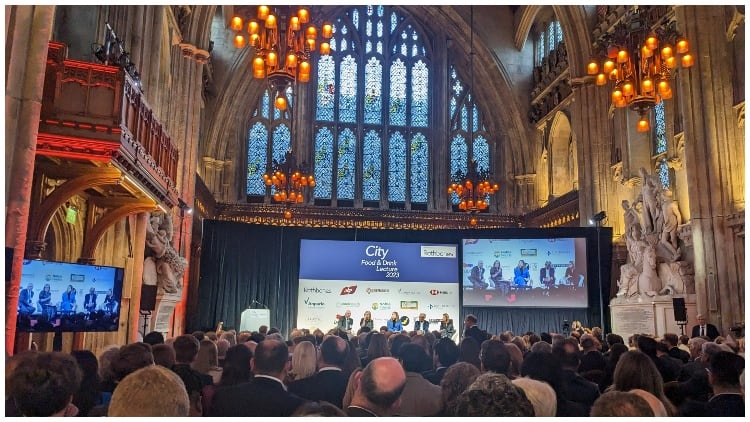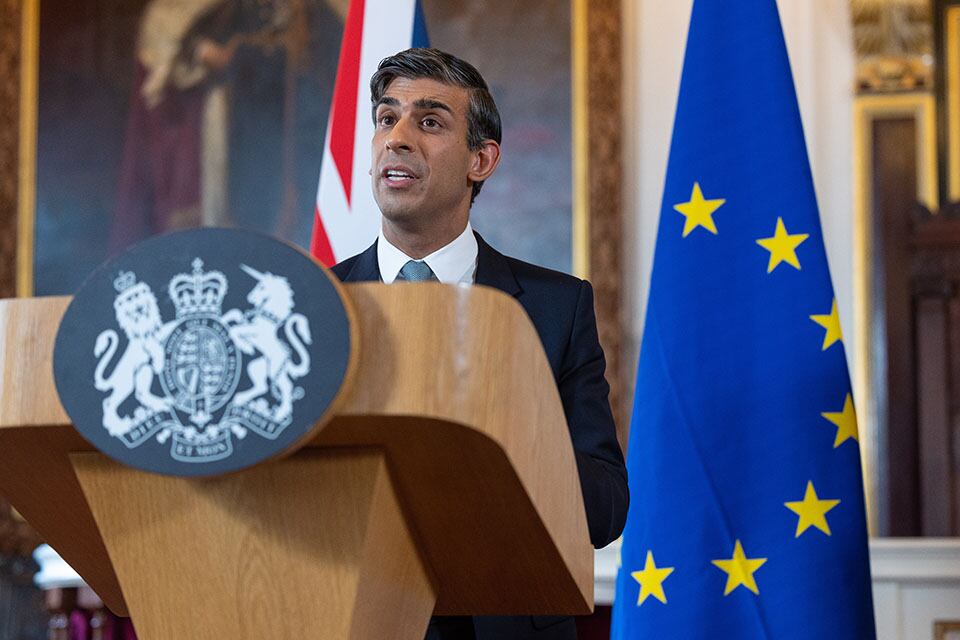In the grand surroundings of the Guildhall, the 22nd City Food & Drink Lecture saw Sir Charles Godfray, director of the Oxford Martin School and its Oxford martin Programme on the Future of Food, discussing the challenge of food security in terms of human and planetary health.
This was followed by a lively panel debate featuring Wilfred Emmanuel-Jones, founder of The Black Farmer; Sophie Lawrence, stewardship and engagement lead at Rathbones Greenbank; and Sue Davies, head of consumer rights and food policy at Which?.
Sir Godfray’s 45-minute talk focused on the below key areas while the panel looked to delve deeper into the subject matter and answer questions from the room.
- Can we feed the world with the projected population?
- The health challenge
- The environmental challenge
- How resilient is the UK food system?
Feeding a growing population
As the RT Hon The Lord Mayor Alderman, Nicholas Lyons said in his welcome address, hardly a day has passed where we’ve not heard news of rising costs, climate change or conflict.
Despite this, Sir Godfray remains hopeful about the future.
“In my advanced age, I am more optimistic about the future now,” he told the 600+ audience, as his lecture referenced not only the positive data suggesting that we’ll see a plateau in population levels (which will lessen the pressure on industry) but also the food and drink sector’s, perhaps surprising, ability to manage multiple shockwaves.

However, although he was optimistic about our chances of feeding a growing population, he was also realistic, stating there will be “some real challenges” in delivering on this.
“We’ll need to increase food production by around 30-60% to feed everyone,” he said, as he questioned how we as a nation should respond.
Delving into this quandary, he raised the subject of the National Food Strategy, which he (and indeed the members of the panel which followed) believes holds some key recommendations that we should be seriously considering if we are to make meaningful impact.
Making use of land and turning to plant-based
In line with the strategy’s recommendation, Sir Godfray noted the importance of making the best use of our land. “We need to look at the comparative advantage of the land to produce [food] or serve things like biodiversity.”
In other words, not all land should in the future be associated with food, rather we need to look at what it can offer – is there land best used for promoting nature alone, for example.
To emphasise the food sector’s environmental impact, Sir Godfray pointed out that if all other industries were to be removed from the equation, including transportation, without change F&B production would still see us going over the 1.5 °C limit.
“If we have any hope, we do need to eat less meat and dairy,” he said (another recommendation of the Dimbleby report) while pointing out that due consideration for livelihoods must be taken and that it would be “wrong to demonise meat”. He stated that he was a flexitarian and that that approach should be sufficient.
Predicting the future, he forecast that “in 10-15 years, the vast majority of meat will be meat substitutes driven by companies to reduce carbon and methane”.
Net Zero and good data will save us but education and ecolabels will make marginal difference
Sir Godfray also held out hope for Net Zero initiatives, stating that such commitments from companies will make a huge difference. What he feels will not – or at least as of yet have only marginally so – are schemes such as eco labels and educational tactics.
"One of the things that may actually make a difference is the commitment that the private sector have made to net zero."
Whatever the case, Sir Godfray was adamant that more academic research into food production and supply chains is required. He also stressed the importance of good data, stating that right now the information we do have is too poor for us to make informed decisions, as he applauded programmes such as the Food Data Transparency Partnership and the Hestia Project which both look set to address this.
How far can AI go in helping us solve today's challenges? Read more here.
“We need better, transparent data in a comparative metric and open to everyone.”
In direct contrast to this during the succeeding panel session, Emmanuel-Jones cautioned the room “not to worship data”.
Fiscal intervention will promote healthier choices
Looking at health and fiscal intervention, Sir Godfray admitted that many – including himself – did not initially believe the soft drinks levy would work.
“We underestimated the sector’s innovative ability.”
In light of this, he regards financial incentive to be a worthwhile consideration in other areas of food and drink, later saying if he could impose one law it would be a levy on fruit juice. While two other panel members stated that they’d be favour of HFSS restrictions.
Sir Godfray also expressed his concerns for detrimental narratives developing around ‘big food’ (i.e. industrial producers) and the impacts this could have on the food system, as well as “knee jerk” negative reactions to regulation.
However, he did observe that if new regulations are to be imposed, sufficient notice and time periods to prepare for them is imperative.
Stop pushing the blame onto food manufacturers
In the panel, chaired by BBC1 Countryfile presenter, Charlotte Smith, Emmanuel-Jones highlighted that as humans, we have a tendency to push the blame onto manufacturers and retailers.
Speaking on the topic of making healthier and more sustainable choices, he said “people need to learn it’s their personal responsibility”.
Unlike Sir Godfray, Emmanuel-Jones believes education to be a very useful tool in helping to achieve this, as he referenced smoking as a good example of how education helped change mindsets and place accountability into the hands of consumers.
Responding to this, Davies reasoned that eating mindfully (both with regards to health and sustainability) is challenging in certain circumstances and industry and government both still have a major role to play.
“We’ve been hanging onto the fact education will solve this, but it hasn’t,” she contended. “We all choose what we want to eat but we need a supportive environment.”
“The role of the Government is to make it easier, especially when times are tough,” added Sir Godfray.
Medicine for weight loss
In terms of the future, Sir Godfray raised concern over the rising trend of medical solutions in favour of food strategy to overcome obesity.
Although he said it may have its place in certain scenarios, he highlighted that this could act as a scapegoat for the UK Government.
He also flagged that the cost of such medicine would likely to be high and therefore accessibility becomes an issue again.
We can't keep arguing
As always, there’s never a quick fix, nor silver bullet when it comes to addressing these big challenges – and there are always disagreements. But it was at least reassuring to hear of Sir Godfray’s faith in humankind to get us out of this hot water.
The key it seems is data – a single source of truth on which we can all trust and rely on and compare. Unless we have this, we’ll be arguing about the same things next year, throwing random numbers back and forth until it’s too late.
Certainly, we can’t depend on data for everything, like Emmanuel-Jones stated, but it’s at least a solid foundation to build upon.
At the end of the day, whether we should eat less meat or push back on consumers, it doesn’t matter who is right, it just matters that we fix the problem.
In other news, the recent IFST Spring Conference explored similar issues of diet-related disease and sustainable production. Read our editor's summary of the event here.





